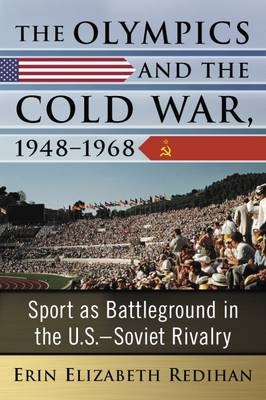
The Olympics and the Cold War, 1948-1968
Sport as Battleground in the U.S.-Soviet Rivalry
Seiten
2017
McFarland & Co Inc (Verlag)
978-1-4766-6788-1 (ISBN)
McFarland & Co Inc (Verlag)
978-1-4766-6788-1 (ISBN)
Based on IOC, US government, and contemporary media sources, this book looks at six consecutive Olympiads to show just how high the stakes became once the Soviets began competing - and threatening America's traditional athletic supremacy - in 1952.
For Olympic athletes, fans and the media alike, the games bring out the best sport has to offer--unity, patriotism, friendly competition and the potential for stunning upsets. Yet wherever international competition occurs, politics are never far removed.
Early in the Cold War, when all U.S.-Soviet interactions were treated as potential matters of life and death, each side tried to manipulate the International Olympic Committee. Despite the IOC's efforts to keep the games apolitical, they were quickly drawn into the superpowers' global struggle for supremacy, with medal counts the ultimate prize. Based on IOC, U.S. government and contemporary media sources, this book looks at six consecutive Olympiads to show how high the stakes became once the Soviets began competing in 1952, threatening America's athletic supremacy.
For Olympic athletes, fans and the media alike, the games bring out the best sport has to offer--unity, patriotism, friendly competition and the potential for stunning upsets. Yet wherever international competition occurs, politics are never far removed.
Early in the Cold War, when all U.S.-Soviet interactions were treated as potential matters of life and death, each side tried to manipulate the International Olympic Committee. Despite the IOC's efforts to keep the games apolitical, they were quickly drawn into the superpowers' global struggle for supremacy, with medal counts the ultimate prize. Based on IOC, U.S. government and contemporary media sources, this book looks at six consecutive Olympiads to show how high the stakes became once the Soviets began competing in 1952, threatening America's athletic supremacy.
Erin Elizabeth Redihan is a visiting history lecturer in the College of General Studies at Boston University and an associate editor of The New England Journal of History. She lives in Rhode Island.
Table of Contents
Acknowledgments
Introduction
Chapter 1. Sport in American Society
Chapter 2. Sport in Soviet Society
Chapter 3. 1948: The Austerity Games
Chapter 4. 1952: The Soviet Debut
Chapter 5. 1956: Blood in the Water
Chapter 6. 1960: The Games in Transition
Chapter 7. 1964: Politics Take Center Stage
Chapter 8. 1968: Politics as Main Event
Chapter 9. Post–1968 Experience and Conclusion
Chapter Notes
Bibliography
Index
| Erscheinungsdatum | 03.12.2016 |
|---|---|
| Zusatzinfo | 9 photos, notes, bibliography, index |
| Verlagsort | Jefferson, NC |
| Sprache | englisch |
| Maße | 152 x 229 mm |
| Gewicht | 376 g |
| Themenwelt | Sachbuch/Ratgeber ► Sport ► Allgemeines / Lexika |
| Geschichte ► Allgemeine Geschichte ► Zeitgeschichte | |
| ISBN-10 | 1-4766-6788-8 / 1476667888 |
| ISBN-13 | 978-1-4766-6788-1 / 9781476667881 |
| Zustand | Neuware |
| Haben Sie eine Frage zum Produkt? |
Mehr entdecken
aus dem Bereich
aus dem Bereich
Gewalt, Umwelt, Identität, Methode
Buch | Softcover (2024)
Spector Books OHG (Verlag)
CHF 49,95
der Osten, der Westen, der Zorn und das Glück
Buch | Hardcover (2024)
S. Fischer (Verlag)
CHF 36,40


